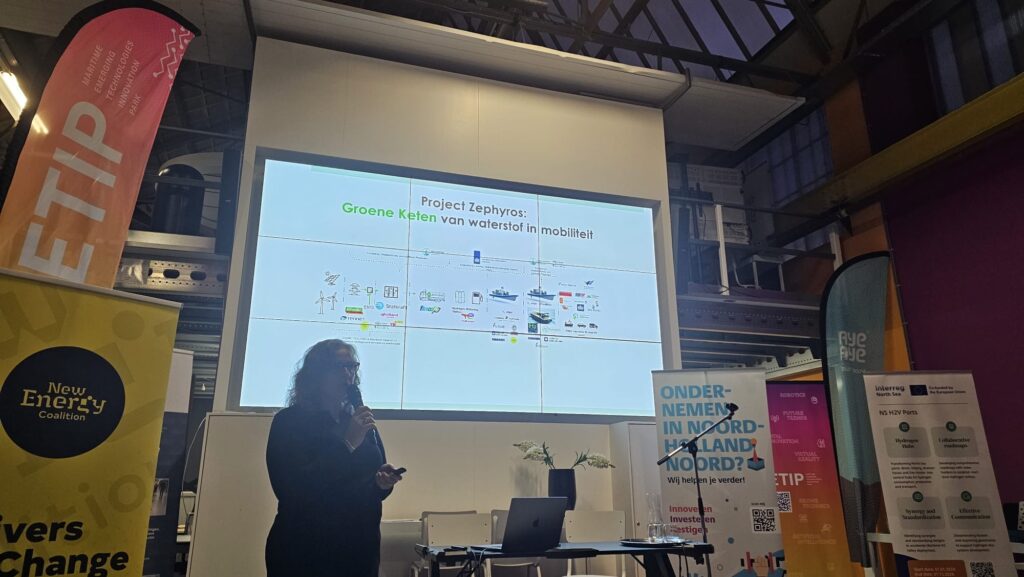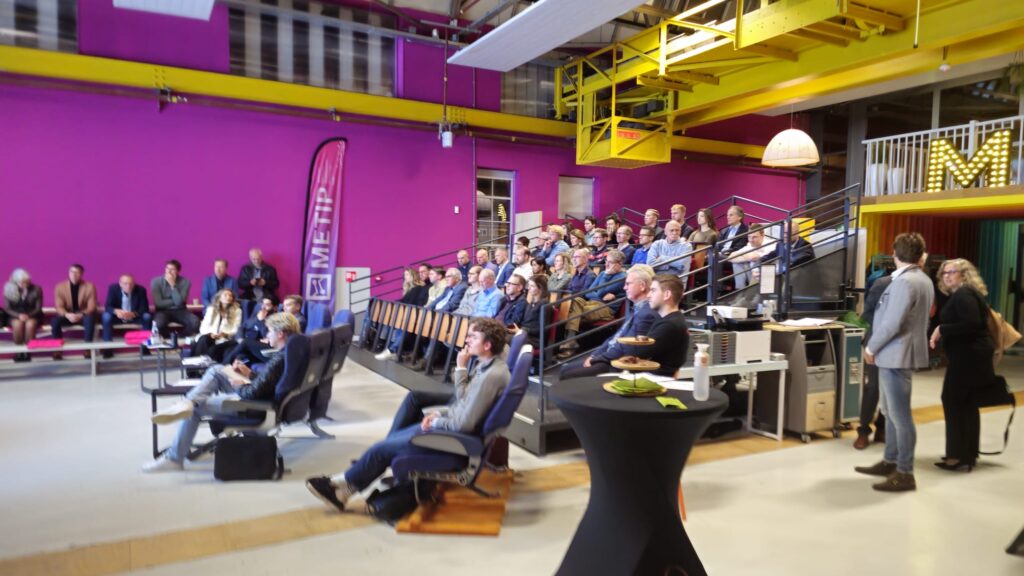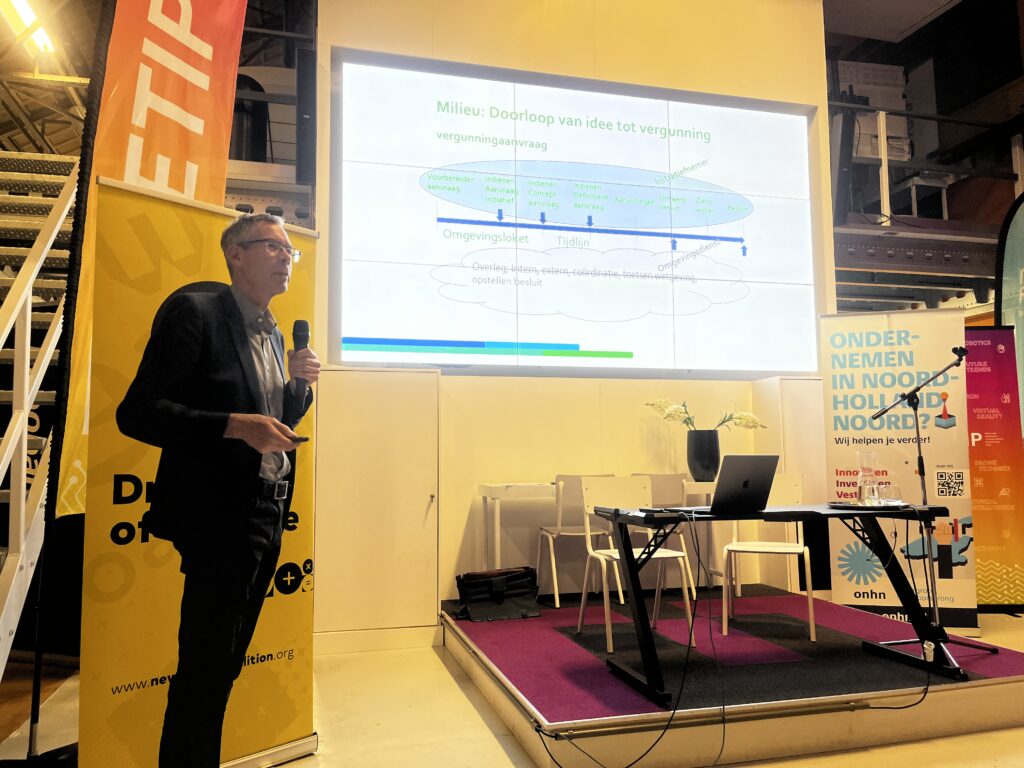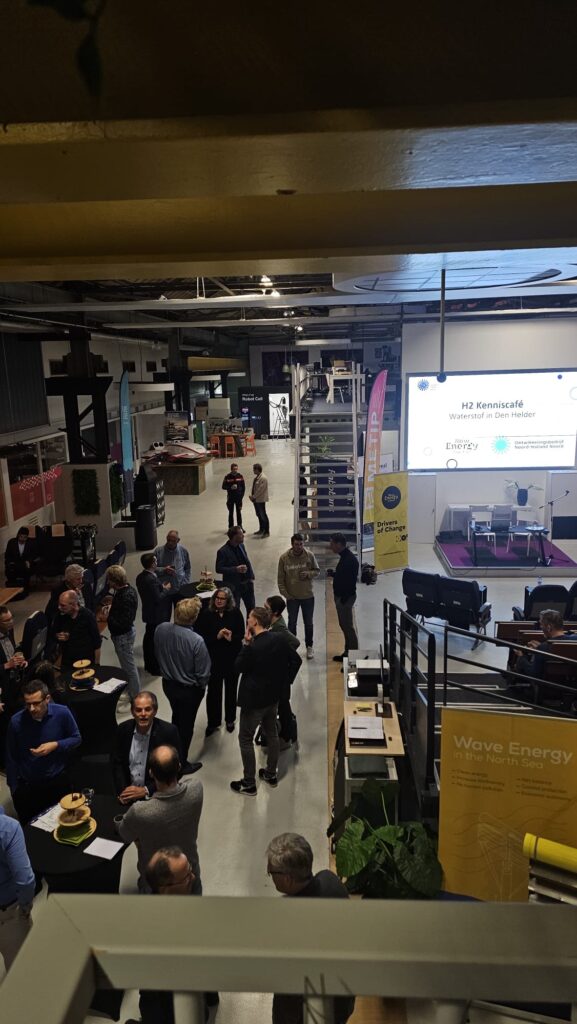The energy transition in and around the port of Den Helder is in full swing and hydrogen plays an important role in this. During a fascinating episode of H2 Kenniscafé, last Thursday at innovation centre METIP in Den Helder, the fifty-plus visitors were updated on a number of special projects. Furthermore, Omgevingsdienst NZKG gave practical tips for a smooth permit application and the kick-off of the European hydrogen project North Sea Hydrogen Valley Ports took place.
After an introduction of the program by Giulietta Cohen (Ontwikkelingsbedrijf Noord-Holland Noord), Katja Naber – Van der Aa, commercial manager Port of Den Helder (PoDH), kicked off the evening. Energy transition is the same as port transition, she told the guests. In order to make port activities more sustainable, a lot needs to be done, such as facilities for bunkering sustainable fuels and offering sustainable shore power. An important part is Zephyros, a project that is being carried out in the port of Den Helder and that focuses on developing the entire chain for green hydrogen; from local production to the delivery via a unique hydrogen filling station.

Next, it was up to Yusuf Kilic of Statkraft Nederland to update the visitors on the latest developments surrounding Statkraft's planned construction of an electrolyser in Den Helder. Statkraft's first electrolyser in the Netherlands will be located on the East Bank and will convert generated renewable electricity into green hydrogen, initially making green hydrogen available to local customers.
Statkraft wants to realize the project step by step, with Zephyros as the starting point. Initially it was about a 1-2 Megawatt electrolyser, this plan has now been revised upwards to a 6 Megawatt electrolyser (approximately the annual consumption of 10-20 inland vessels). The goal is to eventually scale up to 150 MW (approximately 45 vessels). Kilic noted bto be in constant contact with the environment during the progress of the project. The start of Phase 1 is planned for the end of 2027, the permit application has been submitted.
One of the buyers of the hydrogen produced using sustainably generated energy is TEAL Mobility, a joint venture recently set up by Total Energies and Air Liquide to build and operate an international network of hydrogen filling stations. The plans are ambitious. TEAL Mobility aims to build a network of 100 hydrogen filling stations for trucks along European transport routes over the next ten years.
The first twelve stations are already operational, five of which are in the Netherlands. A station is being prepared at Kooijhaven, which will supply hydrogen in the course of next year. It will be a unique example, said Saša Marinić of TEAL Mobility. Unique because the delivery point will not only supply mobile traffic but also shipping with hydrogen. This does, however, result in a number of complications, such as the length of the hydrogen pipeline. In order to bring the hydrogen under pressure to the ships, a pipeline of tens of meters must be laid under the quay.


If we want to make progress with the energy transition, it is important that there are no unnecessary delays in the permit application process. Unfortunately, experience shows that this is not always the case. In order to improve this, the North Sea Canal Area Environmental Service (OD NZKG) has drawn up a Q&A - partly based on input from Fieldlab Hydrogen in Agri – which answers the most important questions of entrepreneurs.
In his presentation, Aldert Kluft (OD NZKG) shared some practical advice. The importance of careful preparation was particularly striking. The case of the contracting company that wants to install a wind turbine was also interesting. “This company may also want to store energy and produce hydrogen. In that case, they need an electrolyser, but probably also storage or transhipment. If that is indeed the case, you need a compressor, which in turn produces noise. It seems simple, yet this project has an impact on various environmental factors.”
To conclude the substantive part of the program, there was the kick-off of North Sea Hydrogen Valley Ports (NS H2V Ports). In this project, New Energy Coalition with various international partners and Development Company North Holland North together on a hydrogen Masterplan for the ports of Den Helder, Esbjerg, Bremen and Brest. In addition to the production of hydrogen and the construction of infrastructure, it also concerns the development of ships that run on hydrogen. A fine example of international cooperation, in which knowledge and experience are shared to reduce risks and accelerate the maritime energy transition.
The H2 Knowledge Café is a joint initiative of New Energy Coalition and Development Company North Holland North and is part of the program of the Regional Deal Maritime cluster Kop van Noord-Holland. Get in touch with other visitors, talk to each other, exchange ideas and come to concrete solutions and initiatives together! Want to join? Sign up as a member of the HydrogenNHN community.
